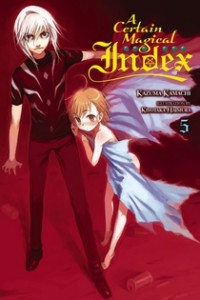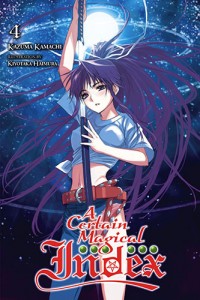By Kazumi Kamachi and Kiyotaka Haimura. Released in Japan as “To Aru Majutsu no Index” by ASCII Mediaworks. Released in North America by Yen On.
I’ve talked before about the way that Japanese manga and light novel series have to be planned out from the start with multiple ways to end, depending on popularity. If the series bombs, there’s the fast “wrap it up in 1 volume” ending. If it plays out as a minor hit, you get a medium-sized ending which develops the plot and characters more. and if it’s a big, big hit – as Index was – then you get to start to take out all your chess pieces and shuffle them around the board, confident that you have the time and audience to stretch and let things simmer for a few volumes till you can fire off all your plot guns. With this volume of A Certain Magical Index, we see Kamachi hitting that point. There’s a whole lot here that is relevant to later volumes down the road.
Introduced in this volume: Hyouka Kazakiri, Aiho Yomikawa, Sherry Cromwell. This takes place literally one day after Book 5 (in fact, we see Touma returning to Academy City at the start of this book), so the timelines for the spinoffs are still the same as the previous book.
While I said that this volume has a lot of setup for future plots down the road, a casual reader wouldn’t necessarily know that, as this is Kamachi’s smoothest work to date, with a minimum of bolded words and encyclopedic dissertations on the nature of superpowers. That isn’t to say that they’re absent, of course, but they blend together better with the story proper, as Komoe lectures Touma on diffusion fields while also reminding him of what’s truly important – saving anyone that’s in front of him. (This also leads to the funniest moment in the book, where Mikoto and Index finally meet each other and realize that they’re both “I didn’t ask to be saved but he saved me anyway” girls in Touma’s nonharem.) The absence of Last Order and Misaka Imouto also means there are less weird speech quirks for the translator to deal with.
This is also, for once, an excellent volume for fans of Index herself. She’s used very well here, showing off her childish side but also demonstrating that childish does not mean stupid, as she manages to go head to head with a giant golem for several minutes. She’s also exactly the sort of all-loving friend that someone like Kazakiri needs. Kazakiri herself is an extremely clever idea, but she’s also a sweet kid, and you feel for her when her sense of self is blown out of the water by Sherry Cromwell and her desire to start a war. As for Sherry herself, it strikes me that this is the first Index villain whose main motivation has simply been revenge. It’s also a misplaced revenge – as Touma hints, Sherry really wants to be stopped, but has to let it be known just how insanely dangerous letting the Magic and Science sides intermingle is.
We also see Aleister Crowley again, and he gets to show off his “mwahaha, just as planned” side to a disbelieving Tsuchimikado. As the mastermind behind most of what has gone on in the past several volumes, he’s clearly the Science Side’s final boss. I wonder if he has an equivalent on the magic side? (Foreshadowing: your key to quality literature.) In the end, there’s simply lots for the Index fan to enjoy here. Good fights, Kuroko being cool briefly (and lecherous, but I’m putting off that rant for a bit), Touma managing to stay out of the hospital for once, and, in perhaps the best moment of the book, Touma, turning his catchphrase he uses against antagonists – “I’ll smash that illusion of yours!” – and motivating Kazakiri by showing her that her own illusion “isn’t something that can be broken so easily!”.
It also breaks the even-numbered curse at last. Definitely recommended for Index fans, and those who like superhero books with 87 million characters.





